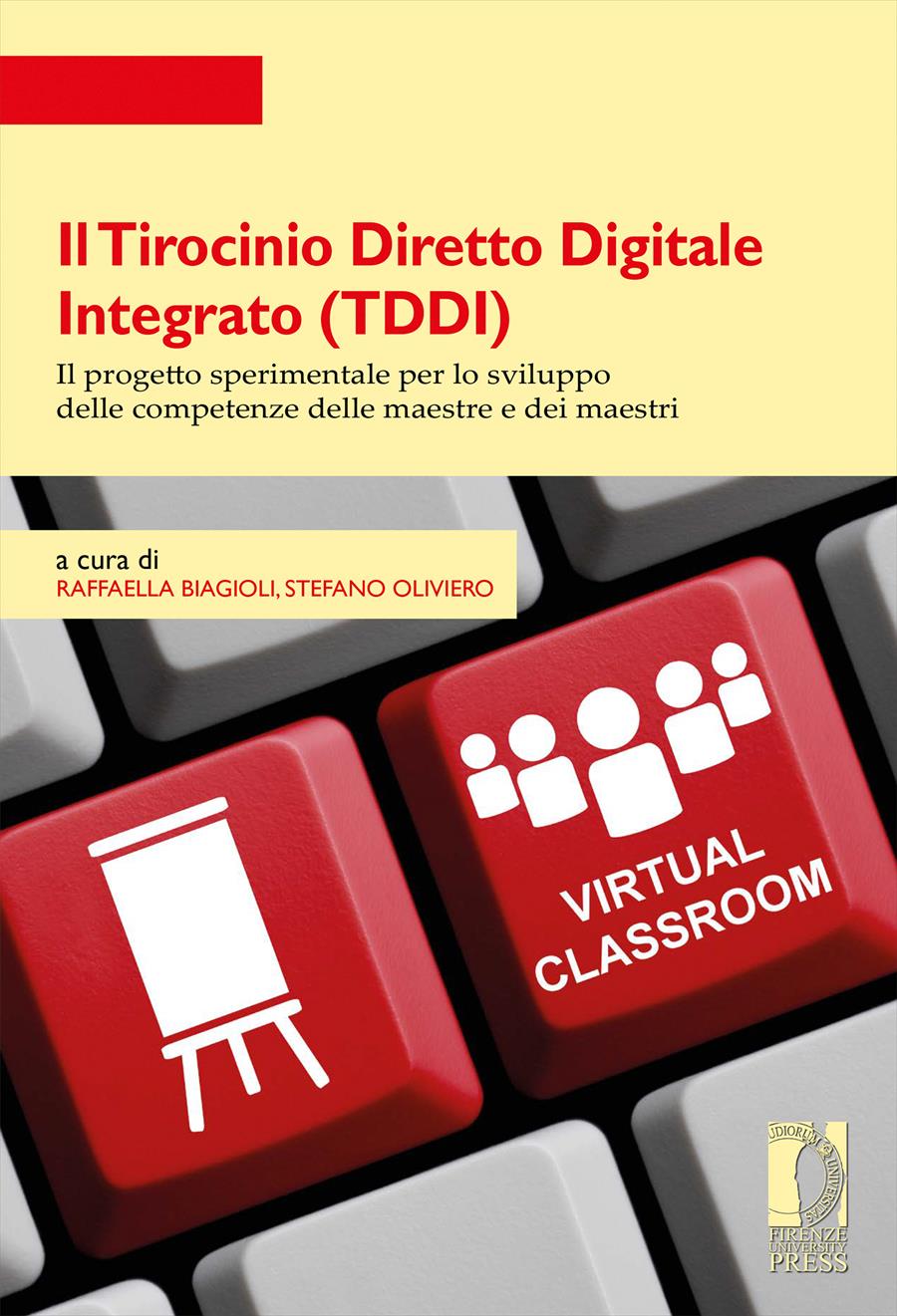- Il Tirocinio Diretto Digitale Integrato (TDDI)
- Edited by Raffaella Biagioli, Stefano Oliviero
Le competenze digitali degli insegnanti
- Maria Ranieri
- © 2022 Author(s) |
- CC BY 4.0
- DOI: 10.36253/978-88-5518-587-5.6
Over the last years, the interest in teachers’ digital competence has become the object of increasing attention. The progressive digitalization of our societies led the European legislator, in 2006, to reformulate the framework of key competences, introducing digital competence among the new knowledge that school has to promote. Of course, both future and in-service teachers need to be prepared to favour students’ digital skills. This brought the European Commission to release in 2017 the DigCompEdu framework. In this chapter, we will first review some of the main conceptual models inspiring the reflection and research around teachers’ knowledge and digital skills. Then, we will focus on the DigComEdu framework, to illustrate its main areas of competences and the operational values.
- Keywords:
- digital competence,
- DigCompEdu,
- teacher professional development,
- teacher,
- school,
University of Florence, Italy - ORCID: 0000-0002-8080-5436
- Buckingham, D. (2009). The future of media literacy in the digital age: some challenges for policy and practice. In P. Verniers (ed.), Media Literacy in Europe. Controversies, challenges and perspectives (pp. 13-24). Bruxelles: Média Animation
- Calvani, A. (2013). I nuovi media nella scuola. Perché, come, quando avvalersene. Roma: Carocci
- Calvani, A., Fini, A., Ranieri, M. (2010). La competenza digitale nella scuola. Trento: Erickson.
- Cappello, G. (2017). Literacy, Media Literacy and Social Change. Where Do We Go From Now?. Italian Journal of Sociology of Education, 9(1), 31-44.
- Carretero Gomez, S., Napierala, J., Bessios, A., Mägi, E., Pugacewicz, A., Ranieri, M., Triquet, K., Lombaerts, K., Robledo Bottcher, N., Montanari, M., & Gonzalez Vazquez, I. (2021). What did we learn from schooling practices during the COVID-19 lockdown. Publications Office of the European Union. DOI: 10.2760/135208
- Ferrari, A, Brecko, B, Punie Y. (2014). DIGCOMP: a Framework for Developing and Understanding Digital Competence in Europe. eLearning papers (38), JRC90109.
- Ferrari, A, Brecko, B, Punie Y. (2014). DIGCOMP: a Framework for Developing and Understanding Digital Competence in Europe. eLearning papers (38), JRC90109. DOI: 10.1016/j.compedu.2020.104052
- Hobbs, R. (2010). Digital and Media Literacy: A Plan of Action. Knight Commission on the Information Needs of Communities in a Democracy. Aspen Institute: Washington DC.
- Krumsvik, R.J. (2008). Situated learning and teachers’ digital competence. Education and Information Technologies, 13(4), 279-290.
- Krumsvik, R.J. (2008). Situated learning and teachers’ digital competence. Education and Information Technologies, 13(4), 279-290. DOI: 10.1080/00313831.2012.726273
- Krumsvik, R.J. (2014). Teacher educators' digital competence. Scandinavian Journal of Educational Research, 58(3), 269-280.
- Krumsvik, R.J. (2014). Teacher educators' digital competence. Scandinavian Journal of Educational Research, 58(3), 269-280.
- Lucas, M., Bem-Haja, P., Siddiq, F., Moreira, A., Redecker, C. (2021). The relation between in-service teachers' digital competence and personal and contextual factors: What matters most? Computers & Education, 160. DOI: 10.2760/159770
- Mishra, P., & Koehler, M. J. (2006). Technological Pedagogical Content Knowledge: A new framework for teacher knowledge. Teachers College Record, 108(6), 1017-1054.
- OECD (2020). Digital Transformation in the Age of COVID-19: Building Resilience and Bridging Divides, Digital Economy Outlook 2020 Supplement. Paris: OECD. www.oecd.org/digital/digital-economy-outlook-covid.pdf. DOI: 10.2760/159770
- Perrotta, C., Gulson, K. N., Williamson, B., & Witzenberger, K. (2021). Automation, APIs and the distributed labour of platform pedagogies in Google Classroom. Critical Studies in Education, 62(1), 97-113.
- Ranieri, M. (2019), Le competenze digitali per la formazione dei cittadini. In P. C. Rivoltella & P. G. Rossi (a cura di), Tecnologie per l’educazione. Milano: Pearson
- Ranieri, M. (2019), Le competenze digitali per la formazione dei cittadini. In P. C. Rivoltella & P. G. Rossi (a cura di), Tecnologie per l’educazione. Milano: Pearson
- Ranieri, M., Bruni, I. (2017). Futuri insegnanti e competenza mediale: sperimentazione di training scenario in modalità blended. In P. Limone, D. Parmigiani (a cura di), Modelli pedagogici e pratiche didattiche per la formazione iniziale e in servizio degli insegnanti (pp. 286-295). Bari: Progedit.
- Redecker, C. (2017). European Framework for the Digital Competence of Educators: DigCompEdu. Luxembourg: EUR 28775 EN, Publications Office of the European Union.
- Redecker, C. (2017). European Framework for the Digital Competence of Educators: DigCompEdu. Luxembourg: EUR 28775 EN, Publications Office of the European Union. DOI: 10.1080/00313831.2012.726273
- Redecker, C. (2017). European Framework for the Digital Competence of Educators: DigCompEdu. Luxembourg: EUR 28775 EN, Publications Office of the European Union.
- Rossi, P. G., Falcinelli, F. (2015). Le tecnologie dell’Istruzione nella Formazione dei docenti. Comunicazione al Convegno EMEMItalia 2015, Teach Different, Genova, 9-11 Settembre.
- UNESCO (2011). ICT Competency Standards for Teachers. Paris: UNESCO DOI: 10.2760/159770
- Unione Europea - Parlamento europeo e Consiglio dell’Unione Europea. 2016. “Recommendation of the European Parliament and of the Council of 18 December 2006 on Key Competences for Lifelong Learning (2006/962/EC)”. Official Journal of the European Union L 394: 10-18.
Chapter Information
Chapter Title
Le competenze digitali degli insegnanti
Authors
Maria Ranieri
DOI
10.36253/978-88-5518-587-5.6
Peer Reviewed
Publication Year
2022
Copyright Information
© 2022 Author(s)
Content License
Metadata License
Bibliographic Information
Book Title
Il Tirocinio Diretto Digitale Integrato (TDDI)
Book Subtitle
Il progetto sperimentale per lo sviluppo delle competenze delle maestre e dei maestri
Editors
Raffaella Biagioli, Stefano Oliviero
Peer Reviewed
Number of Pages
178
Publication Year
2022
Copyright Information
© 2022 Author(s)
Content License
Metadata License
Publisher Name
Firenze University Press
DOI
10.36253/978-88-5518-587-5
ISBN Print
978-88-5518-586-8
eISBN (pdf)
978-88-5518-587-5
Series Title
Strumenti per la didattica e la ricerca
Series ISSN
2704-6249
Series E-ISSN
2704-5870
